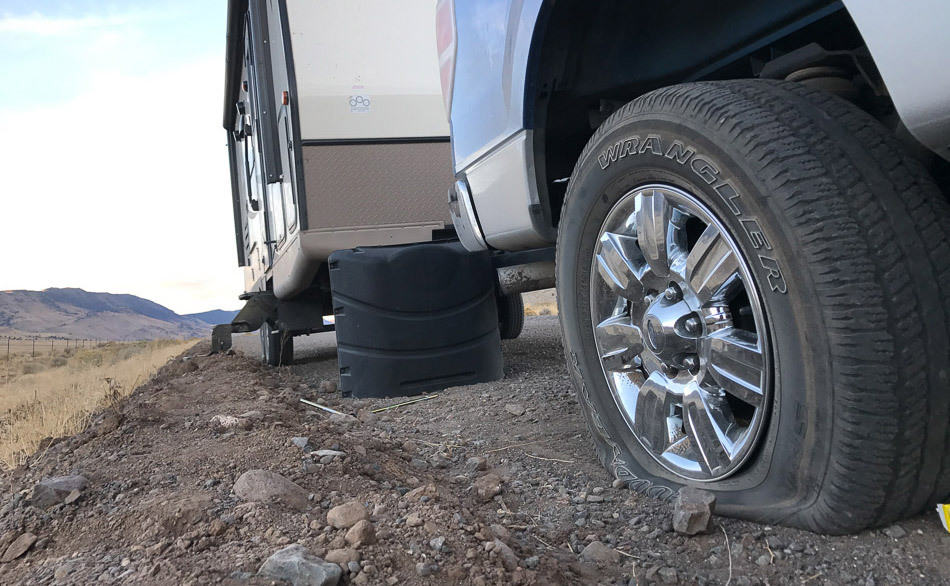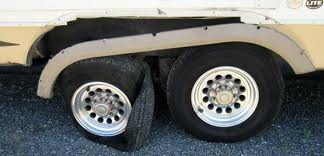How Often Do You Need to Change Rv Tires?
RV tires are essential to the safety and performance of your vehicle, but how often should they be changed? The answer may surprise you. While it’s generally recommended that car tires be changed every 5-6 years, RV tires can last much longer.
With proper maintenance, RV tires can easily last 10-12 years. Of course, this all depends on how often you use your RV and what type of terrain you typically travel on. If you frequently take your RV off-roading or travel on rough roads, you’ll need to change your tires more often than if you stick to smooth highways.
If you’re like most RVers, you probably don’t think about your tires very often. But the truth is, they are one of the most important parts of your RV. And, just like any other tire, they need to be changed periodically.
So how often do you need to change RV tires? The answer isn’t as simple as a definitive number of miles or years. There are a lot of factors that can affect how often you need to change your RV’s tires.
For example, what type of terrain do you typically drive on? Do you make a lot of short trips or long hauls? How well do you maintain your RV?
All these factors can impact how often you need to change your RV tires. As a general rule of thumb, however, most experts recommend changing them every 3-5 years. Of course, if you start to notice any issues with your tires before that time frame, it’s always best to err on the side of caution and get them changed sooner rather than later.
So there you have it! Now that you know how often to change RV tires make sure to add it to your regular maintenance schedule. Your tires will thank you for it!
How Often and When To Replace RV Tires & How To Save on Tire Replacement?
How Do You Know If Your Rv Tires are Bad?
It’s important to regularly inspect your RV tires for signs of wear and tear. Here are some things to look for that may indicate it’s time to replace your tires:
1. Cracks or splits in the sidewall: These can weaken the structure of the tire and lead to a blowout.
2. Bulges or bald spots on the tread: This indicates that the tire is worn and could fail while you’re driving.
3. Excessive vibration when driving: This could be a sign that the tire is out of balance or has other issues that need to be addressed. If you notice any of these problems, it’s best to have your tires checked by a professional as soon as possible.
They can help you determine if they need to be replaced or if there’s another issue at play.
How Long are Tires Good for on a Travel Trailer?
On average, travel trailer tires are good for 5-6 years. However, this varies depending on the brand of tire, how often you use your travel trailer, and how well you maintain your tires. It’s important to check your tires regularly for signs of wear and tear, such as cracks or bald spots.
If you notice any damage, it’s best to replace your tires as soon as possible.

Credit: camperreport.com
How Long Do Class Motorhome Tires Last?
How Long Do Class A Motorhome Tires Last? The short answer is that Class A motorhome tires last as long as any other type of vehicle tire – with proper maintenance, they can last for tens of thousands of miles. However, because motorhomes are larger and heavier than most other vehicles on the road, there are a few things you need to keep in mind in order to get the most out of your tires.
Here are some tips on how to extend the life of your Class A motorhome tires:
1. Check Your Tire Pressure Regularly: One of the most important things you can do to extend the life of your tires is to check their pressure regularly. This is especially important if you frequently travel long distances or carry heavy loads, as both can put extra strain on your tires. Use a reliable tire pressure gauge – many gas stations have them available for public use – and check your tires’ pressure when they’re cold (meaning, before you’ve driven them for at least an hour). If one or more of your tires is significantly low on air, add air until it reaches the manufacturer’s recommended PSI level. You can usually find this information on a sticker inside your doorjamb or in your owner’s manual.
2. Rotate Your Tires Frequently: Another good way to extend the life of all four of your motorhome’s tires is to rotate them frequently. This helps distribute wear evenly across all four tires instead of letting one tire take all the brunt whenever you travel long distances or carry heavy loads (as we mentioned above). How often should you rotate your RV’s tires? Most experts recommend every 5,000 miles or so – but again, consult your owner’s manual or ask a professional mechanic for guidance specific to your vehicle model and make.
Rv Tire Replacement Recommendations
When it comes to RV tire replacement, there are a few things you need to keep in mind. First, you need to make sure that the new tires you purchase are the correct size and type for your RV. Secondly, you need to be aware of the load rating of the new tires. Lastly, pay close attention to the tread depth and speed rating when choosing new RV tires. The first thing you need to do when replacing your RV’s tires is to measure the width, height, and diameter of the existing ones. You can find this information on the sidewall of the tire.
Once you have this information, you can start shopping for new RV tires. Be sure to purchase tires that are sized correctly for your specific rig – don’t try to save money by buying smaller or larger ones, as they may not provide adequate support or grip while driving. It’s also important to be aware of load ratings when replacing RV tires.
The load rating is how much weight each tire can safely carry; this is different from simply how much weight your RV itself weighs. Make sure that the new set of tires has a higher load rating than your old ones so that they can better handle any additional weight from cargo or passengers. Additionally, check the speed rating on both sets of tires – if your old ones had a lower speed rating than what is recommended for highway driving speeds (typically “S” or above), then upgrading will help improve your safety while on road trips.
Finally, take a look at both tread depth and wear patterns before making a decision on which RV tires to buy. Deeper tread depths mean more gripping power and longer life expectancy; however, they also tend to cost more upfront. If budget is a concern, but you still want good quality, look for an all-season tire with at least 10/32” tread depth remaining (or 4mm if using metric measurements).
Checking wear patterns can also give insight into whether it’s time for an upgrade – if there is uneven wear across the width of the tire or bald spots starting to form, it means it’s time for some new rubber!
How Long Do Michelin Rv Tires Last?
Michelin RV tires are some of the longest-lasting and most durable on the market. With proper care and maintenance, they can easily last upwards of 50,000 miles. That’s nearly double the average lifespan of most other brands!
So, what’s the secret to getting such longevity out of your Michelin RV tires? First and foremost, it’s important to regularly inspect them for any signs of wear or damage. Be sure to check the tread depth and sidewalls for any cracks, splits, or bulges.
If you notice any of these issues, it’s best to have the tire professionally repaired or replaced as soon as possible. In addition to regular inspections, it’s also important to keep your Michelin RV tires properly inflated. This will help prevent premature wear and tear.
It’s also a good idea to rotate them every 5-6 thousand miles or so. This will ensure even wear and tear over time. Finally, don’t forget about storage!
When not in use, be sure to store your Michelin RV tires in a cool, dry place out of direct sunlight. This will help prolong their lifespan even further. With just a little bit of care and attention, your Michelin RV tires can easily last for many years to come!
Conclusion
It is important to regularly inspect your RV tires for any signs of wear and tear. Depending on how often you use your RV, you may need to change your tires every few years. If you notice any cracks or bulges in your tires, it’s time to replace them.


